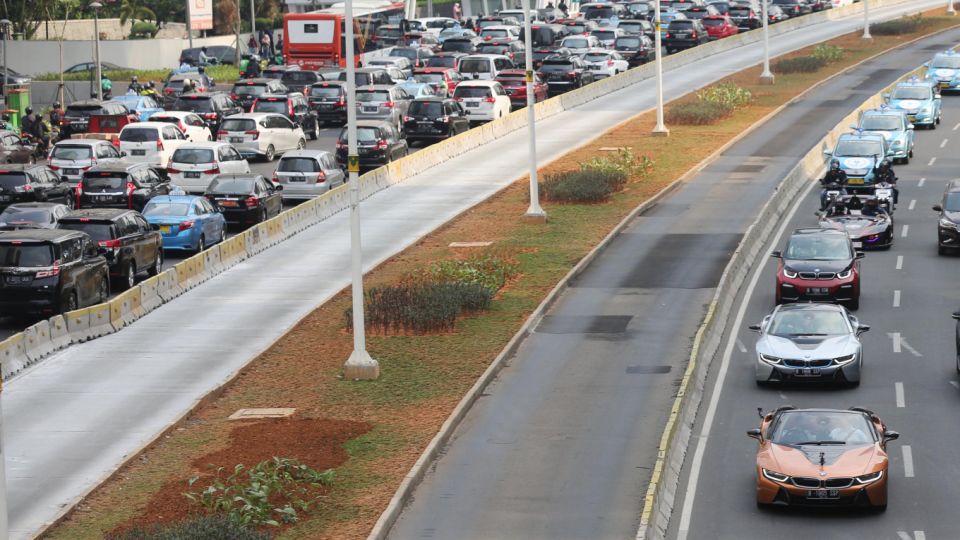September 21, 2022
JAKARTA – Critics have berated the government for promoting electric vehicles (EVs) and stoves but failing to ensure the power consumed comes from clean sources.
The government is pushing consumers to rely more on electricity and less on oil or gas as part of the country’s energy transition, but environmentalists and a researcher have told The Jakarta Post the move, for now, means little more than shifting from one fossil fuel to another.
Earlier this month, President Joko “Jokowi” Widodo signed a presidential instruction to replace hundreds of thousands of government service vehicles across the country with electric ones in a policy that took effect on Sept. 13. Several state-owned bus companies, meanwhile, have begun to or are about to operate electric buses.
Also earlier this month, State-Owned Enterprises (SOEs) Minister Erick Thohir said that, starting next year, the state would spend nearly Rp 5 trillion (US$334.7 million) annually to provide free electric stoves for millions of households currently using heavily subsidized liquefied petroleum gas (LPG) for cooking.
Separately, state-owned electricity monopoly PLN initialized a program of its own this year to give away more than 300,000 electric stoves.
“All of these efforts will help us reduce our oil and gas imports,” Djoko Siswanto, secretary general of the National Energy Board (DEN), told the Post on Friday, adding that the government considered electrification as a step bringing the country closer to clean energy.
Oil and gas imports have become increasingly expensive over the past months, following global supply disruption that led to soaring prices. Indonesia has hiked prices of subsidized fuel by 30 percent to lessen the burden on the state budget, but left unchanged prices for the 3-kg LPG cylinders meaning cooking gas remains far below market prices.
PLN estimates the government could save Rp 10.21 trillion annually on 3-kg LPG subsidies by converting 15.3 million gas stoves to electric ones.
Meanwhile, Indonesia Battery Corporation (IBC), the SOE created to make Indonesia a key player in global EV supply chains, estimates that a 30 percent transition to EVs could save the country up to 30 million barrels of oil imports annually.
Djoko added that the policy might also help resolve the country’s excess supply of electricity, which has been hurting PLN’s finances and the state budget, as electricity demand growth lagged far behind supply growth in recent years, when the country invested heavily in electricity generating capacity.
“Our challenge today is to create demand. That’s why we are pushing EVs and electric stoves,” Djoko said.
Komaidi Notonegoro, executive director at Jakarta-based research firm ReforMiner Institute, told the Post on Friday that the transition pursued by the government may only help solve cost issues but not environmental ones, or possibly neither.
He explained that coal still accounted for more than half of Indonesia’s power generation of 76.3 gigawatts this year, followed by natural gas, according to Energy and Mineral Resources Ministry data. Next year, around 17.5 GW in additional capacity would enter the grid, most of which will come from coal, the data show.
“If the government is aiming for [environmental goals], we may not be able to achieve that, because, in the end, we would be shifting more toward coal,” Komaidi said.
Abundant coal reserves allow Indonesia to use the fuel for domestic purposes at low costs, making it a viable option amid high fuel prices.
Tata Mustasya, regional climate and energy campaign strategist at Greenpeace Southeast Asia, said on Friday that Indonesia’s energy transition was far from complete, as it had yet to drastically reduce the reliance on fossil fuels in electricity generation. “
Before we decide to make everything electric, like EVs or electric stoves, the electricity itself must come from renewables. Let’s not just move the emission problem from oil to coal,” he told the Post.
Rather than solving environmental problems, Tata argued, the government may be aiming to save PLN from the financial trouble from excess electricity supply caused by the long-term project to add 35 GW to national power generation capacity.
Fanny Tri Jambore, a campaigner at the Indonesian Forum for the Environment (Walhi), called the country’s energy transition “half-hearted” as it would give the government more reasons to retain most of the country’s coal-fired power plants.
A planned phase-out of coal plants, the environmental activist added, would not be enough, as the program left limited room for renewables.
“Since almost 80 percent of our electricity comes from fossil fuels, the transition will benefit fossil fuel producers the most,” Fanny told the Post on Friday.


